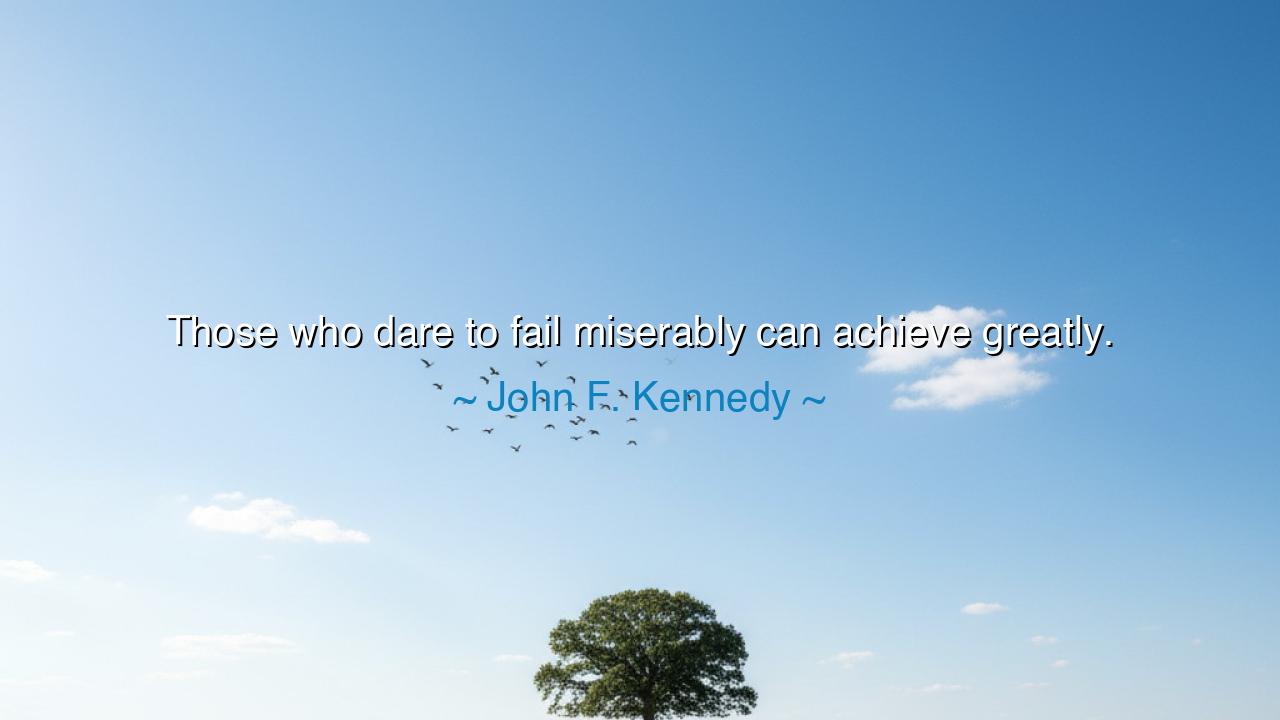
Those who dare to fail miserably can achieve greatly.






“Those who dare to fail miserably can achieve greatly.” — John F. Kennedy.
Thus spoke John Fitzgerald Kennedy, a man whose words carried the flame of courage into the hearts of a generation. In this mighty saying lies one of the oldest truths known to humankind — that greatness is born not in safety, but in risk; not in certainty, but in the willingness to face ruin for the sake of vision. The one who fears failure will live small and quiet, but the one who dares to fail miserably will rise to heights that timid hearts can never reach. For to fail “miserably” is to have tried greatly, and there is no shame in defeat when it springs from the pursuit of something noble.
The origin of this quote is rooted in Kennedy’s philosophy of leadership and boldness, spoken during his years as a senator and echoed throughout his presidency. It reflects the spirit of his era — an age when humanity stood at the threshold of space, when the unknown beckoned, and fear was a luxury the world could no longer afford. Kennedy himself embodied the ideal of daring: he led a nation through uncertainty, through the shadows of nuclear peril and the dawn of exploration. When he declared, “We choose to go to the moon, not because it is easy, but because it is hard,” he was giving voice to the same spirit contained in this quote. He knew that failure and greatness are twin sons of the same mother — courage.
The ancients, too, understood this divine paradox. The Greeks told of Prometheus, who defied the gods themselves to bring fire to mankind. For his gift, he was punished and bound, but through his suffering, humanity rose from darkness. Likewise, the great explorers who set sail across uncharted seas — men like Magellan and Columbus — risked not only their lives, but the possibility of utter disaster. Yet without their daring, the world would have remained smaller. To dare to fail is to live with the soul of a hero — one who would rather perish in pursuit of the impossible than survive in the shadow of mediocrity.
Even in modern times, history sings of such spirits. Thomas Edison, mocked and doubted, failed over a thousand times in his attempts to create the electric light. When asked about his failures, he replied, “I have not failed. I’ve just found 10,000 ways that won’t work.” His words echo Kennedy’s — that to fail greatly is the price of achieving greatly. The Wright brothers, ridiculed by those who believed man would never fly, built wings from hope and fell countless times before rising above the earth. Each failure was not a fall from grace but a step toward destiny.
Kennedy’s words also carry a moral weight: they remind us that comfort is the enemy of greatness. The one who plays it safe will never know the sweetness of victory, nor the pride that comes from endurance. To “dare to fail miserably” is to live with passion — to throw oneself wholly into the current of life, knowing the waves may drown but also that they may lift one higher than one ever dreamed. It is the courage of those who build nations, who write symphonies, who love without guarantee. Greatness, after all, does not bloom in perfect soil — it grows in the cracks between failure and faith.
And yet, Kennedy’s wisdom is not reckless. It is not the madness of blind risk, but the discipline of courage — the knowledge that the possibility of failure must never outweigh the worthiness of the goal. He speaks to the spirit that accepts defeat as a teacher, not a curse. For in the eyes of the wise, every failure is a revelation — each broken attempt a map toward mastery. The one who fears failure will never begin, but the one who learns from it will never truly lose.
So let this be the lesson for all who walk the path of ambition: Do not fear to fail, fear only to never try. When the world mocks your efforts or when your dreams collapse into dust, remember that every fall is sacred if it is taken in pursuit of something true. Dare to dream so vast that failure seems inevitable, and yet march toward it with a fearless heart. For it is written in the spirit of every great soul: the road to triumph passes through the valley of defeat.
Thus, as John F. Kennedy taught, greatness belongs not to the flawless, but to the fearless. Those who dare to fail miserably — those who risk rejection, loss, and pain — are the ones who lift humanity forward. Their failures light the path, their courage builds the bridge. And when their hour comes, even if they fall, they fall among the stars — having reached higher, dared harder, and lived more bravely than those who never dared at all.






AAdministratorAdministrator
Welcome, honored guests. Please leave a comment, we will respond soon